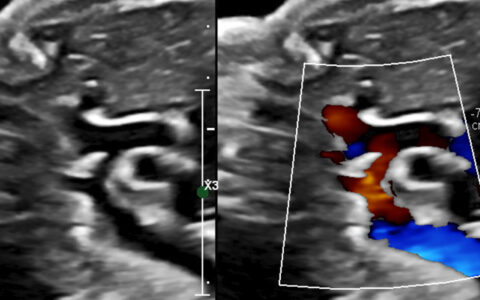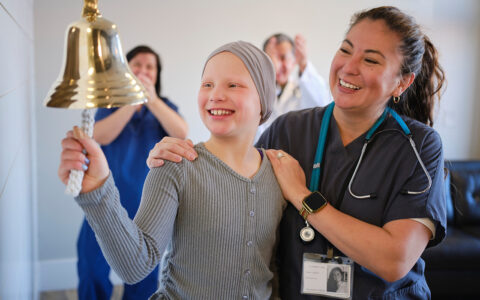Today, expectant parents are bombarded with multiple, potentially confusing marketing messages about a prenatal chromosome test called cell-free DNA (cfDNA) screening.
To determine how best to help patients make truly informed choices, Vanderbilt University Medical Center researchers and colleagues embarked on a recent study, whose results were published in the Journal of Genetic Counseling.
“Non-invasive prenatal screening, which is now referred to as ‘prenatal cell-free DNA screening,’ reached the market in the fall of 2011 and is now the recommended screening test for chromosome abnormalities for all singleton pregnancies,” said Jill Slamon, M.A.T., M.S., a genetic counselor and an assistant professor in the Department of Obstetrics and Gynecology at Vanderbilt.
Specifically, prenatal cfDNA screens for trisomies 13, 18, and 21. Trisomy refers to the presence of three chromosomes in a pair where there are typically two.
Examining Informed Choice
The researchers used the Multidimensional Measure of Informed Choice (MMIC), a previously validated psychometric measure developed in the United Kingdom for medical screening to assess a person’s knowledge about the test, their attitude toward it, and their decision to proceed or forego it. Before using the MMIC to assess a participant’s decision-making, researchers swapped certain phrasing from British English to the American equivalent.
“A team of researchers in the U.K. previously validated the MMIC to describe the choices made by women offered prenatal cfDNA screening, but validation of the instrument in North American had not been done,” Slamon said. “Our study is the first one that’s used MMIC to describe women’s choices [about prenatal cfDNA screening] in the United States.”
Elements assessed include decision-makers’ factual knowledge about the test in question, their stated attitude toward it, and the final decision.
“If a person demonstrates adequate knowledge about the screening test, demonstrates a favorable attitude towards it, and then undergoes the screening test, that’s considered an informed choice,” Slamon said.
A person who can’t demonstrate adequate knowledge about the screening test by correctly answering questions about its limitations and benefits is considered to be making an uninformed choice.
Also considered uninformed is a decision that fails to align with the individual’s stated attitude.
“If they have an unfavorable attitude towards the screen, yet they do it anyway, that isn’t an informed choice,” Slamon said.
Most Were Informed
The MMIC results characterized 88.7 percent of the participants as having made an informed choice and 11.3 percent as having made an uninformed choice, the authors wrote.
Of the six participants identified as making an uninformed choice, four had poor factual knowledge but expressed positive attitudes towards screening and thus made the decision to go forward with the test. Two of the women categorized as making an uninformed choice had sufficient knowledge, but there was a discrepancy between their attitude and the choice made.
Participating in the study were 53 women ranging in age from 24 to 47 years who met with a genetic counselor for pre-test counseling. The women completed an online survey about their prenatal cfDNA screening decision. Eighty-seven percent identified as white, 80 percent reported having a college degree or higher, and 75 percent reported a religious faith.
In-person genetic counseling accounted for 68 percent of those recruited to participate in the study, while 32 percent had undergone a telemedicine consultation.
In this rather small and well-educated population, 92.5 percent underwent the prenatal cfDNA screening; 3.8 percent declined the screening; and 1.9 percent chose amniocentesis as an alternative. Another 1.9 percent elected to undergo screening but did not follow through with the sample collection necessary for the test.
Tracking Outcomes
It is important for organizations to track and measure health care outcomes, which informed choice testing helps to measure, Slamon emphasized.
“Our study showed that the MMIC could be used as a patient-reported outcome measure to demonstrate the value of genetic counselors in facilitating informed choices for patients offered prenatal cfDNA screening.”
“MMIC could be used as a patient-reported outcome measure to demonstrate the value of genetic counselors in facilitating informed choices.”




